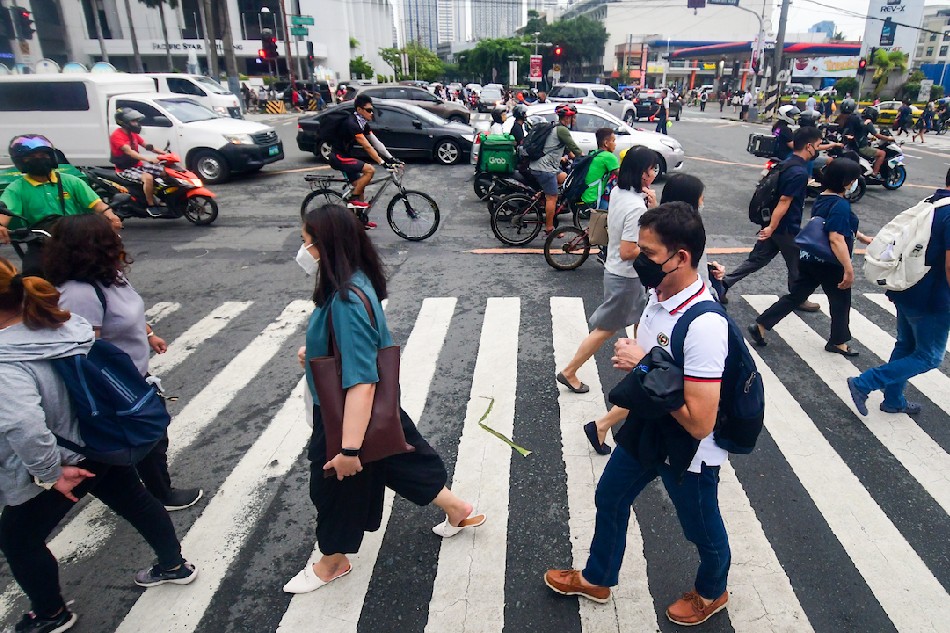Philippines still 'low risk' for COVID-19, says DOH | ABS-CBN
ADVERTISEMENT

Welcome, Kapamilya! We use cookies to improve your browsing experience. Continuing to use this site means you agree to our use of cookies. Tell me more!
Philippines still 'low risk' for COVID-19, says DOH
Philippines still 'low risk' for COVID-19, says DOH
Michael Delizo,
ABS-CBN News
Published Jul 31, 2022 02:11 PM PHT
MANILA — The Philippines is still at low risk for COVID-19 despite the increase in new cases, the Department of Health (DOH) said on Saturday.
MANILA — The Philippines is still at low risk for COVID-19 despite the increase in new cases, the Department of Health (DOH) said on Saturday.
In a statement to media, the DOH said the country has an average daily attack rate of 2.52 cases per 100,000 population, and a bed and intensive care unit (ICU) utilization rate of less than 29 percent and 24 percent, respectively.
In a statement to media, the DOH said the country has an average daily attack rate of 2.52 cases per 100,000 population, and a bed and intensive care unit (ICU) utilization rate of less than 29 percent and 24 percent, respectively.
“Even with the observed increase in cases, it is more important that our bed and ICU utilization rates stay low -- meaning our hospitals stay open and not overwhelmed,” the DOH said.
“Even with the observed increase in cases, it is more important that our bed and ICU utilization rates stay low -- meaning our hospitals stay open and not overwhelmed,” the DOH said.
But preventive health education and health reform advocate Dr. Tony Leachon said the government should not be complacent with the low hospital utilization rate.
But preventive health education and health reform advocate Dr. Tony Leachon said the government should not be complacent with the low hospital utilization rate.
ADVERTISEMENT
He said there is still a need to prevent the spread of infection albeit mild to increase the country’s economic productivity.
He said there is still a need to prevent the spread of infection albeit mild to increase the country’s economic productivity.
“Kasi itong parang ginagawa natin right now, ‘Okay lang maraming cases tayo basta’t wala lang magla-land sa hospital.’ That’s the approach to prevent it. You have to decrease the number of cases as well. And how do you decrease the number of cases? You have to protect the population to become resilient. ‘Pag kokonti ang cases mo, then you have a productive workforce,” Leachon said.
“Kasi itong parang ginagawa natin right now, ‘Okay lang maraming cases tayo basta’t wala lang magla-land sa hospital.’ That’s the approach to prevent it. You have to decrease the number of cases as well. And how do you decrease the number of cases? You have to protect the population to become resilient. ‘Pag kokonti ang cases mo, then you have a productive workforce,” Leachon said.
The DOH acknowledged there is still a need to improve vaccination and booster coverage to help prevent severe and critical cases, as well as follow proper sanitation and health protocols.
The DOH acknowledged there is still a need to improve vaccination and booster coverage to help prevent severe and critical cases, as well as follow proper sanitation and health protocols.
The Philippines' active COVID-19 cases on Saturday breached 33,000, as it logged 3,996 cases, bringing the total confirmed cases to 3,772,468.
The Philippines' active COVID-19 cases on Saturday breached 33,000, as it logged 3,996 cases, bringing the total confirmed cases to 3,772,468.
Health authorities have attributed the slight rise in new COVID-19 cases to the population's waning immunity and the presence of omicron subvariants.
Health authorities have attributed the slight rise in new COVID-19 cases to the population's waning immunity and the presence of omicron subvariants.
The positivity rate from July 24 to 29 is at 16.2 percent, way above the World Health Organization's 5 percent benchmark.
The positivity rate from July 24 to 29 is at 16.2 percent, way above the World Health Organization's 5 percent benchmark.
The government on Saturday announced that Metro Manila and dozens of areas will remain under the lowest of the country's 5-tier COVID-19 alert level system until Aug. 15.
The government on Saturday announced that Metro Manila and dozens of areas will remain under the lowest of the country's 5-tier COVID-19 alert level system until Aug. 15.
It also downgraded the alert status of 10 cities to Alert level 1.
It also downgraded the alert status of 10 cities to Alert level 1.
The Philippines logged its first confirmed COVID-19 case on Jan. 30, 2020 in a Chinese woman who arrived from Wuhan City, China where the disease is believed to have first emerged. Its vaccination program started on March 1, 2021.
The Philippines logged its first confirmed COVID-19 case on Jan. 30, 2020 in a Chinese woman who arrived from Wuhan City, China where the disease is believed to have first emerged. Its vaccination program started on March 1, 2021.
RELATED VIDEO
Read More:
COVID-19
coronavirus
Department of Health
intensive care unit
coronavirus Philippines update
DOH
ADVERTISEMENT
ADVERTISEMENT



